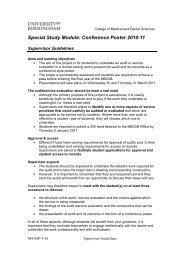Advice on Needlestick Injuries
Advice on Needlestick Injuries
Advice on Needlestick Injuries
Create successful ePaper yourself
Turn your PDF publications into a flip-book with our unique Google optimized e-Paper software.
What is an inoculati<strong>on</strong> injury?<br />
An inoculati<strong>on</strong> injury is any incident<br />
where somebody’s blood or a body<br />
fluid could c<strong>on</strong>taminate your blood<br />
or mucous membranes (linings of the<br />
eye, nose, or mouth) This could be a<br />
result of a bite scratch or splash.<br />
What do I do if I have an inoculati<strong>on</strong><br />
injury?<br />
First wash the area thoroughly<br />
and encourage it to bleed<br />
Who do I inform about the injury?<br />
Inform your manager, or most<br />
senior member of staff about the injury<br />
As so<strong>on</strong> as possible after the injury<br />
c<strong>on</strong>tact the Occupati<strong>on</strong>al Health and<br />
Safety Department or local A&E Dept<br />
(Out of hours).<br />
Why inform Occupati<strong>on</strong>al Health<br />
about the injury?<br />
Occupati<strong>on</strong>al Health will check your<br />
records for your vaccinati<strong>on</strong> history and<br />
level of immunity, and advise you <strong>on</strong> the<br />
appropriate acti<strong>on</strong> to be taken. If it occurs<br />
out of hours then inform and attend A&E.<br />
Urgent Acti<strong>on</strong><br />
If you have an inoculati<strong>on</strong> injury from a<br />
source that is known to be<br />
HIV positive<br />
Hepatitis B positive<br />
Hepatitis C positive<br />
You must act immediately and report<br />
the injury to Occupati<strong>on</strong>al Health or<br />
A&E.<br />
Why does the incident need to be reported<br />
immediately?<br />
If the patient is infected with or at high risk of<br />
‣ HIV There are tablets available that may<br />
be able to prevent you c<strong>on</strong>tracting the virus.<br />
However to maximise its effect this must be<br />
commenced within <strong>on</strong>e hour of the injury<br />
occurring.<br />
‣ Hepatitis B. If you are not immune to<br />
hepatitis B and come into direct c<strong>on</strong>tact with<br />
the blood or body fluid of some<strong>on</strong>e who has<br />
the virus Hepatitis B immunoglobulin can be<br />
given up to 48 hours after the injury. This<br />
is not a substitute for immunisati<strong>on</strong>.<br />
It is essential that you are aware whether you<br />
have immunity to Hepatitis B. If you have had a<br />
poor or no resp<strong>on</strong>se to vaccinati<strong>on</strong>, or have not<br />
yet been vaccinated then you must inform the<br />
pers<strong>on</strong> dealing with the incident. If the injury<br />
occurs out of hours A&E will not be able to<br />
access your vaccinati<strong>on</strong> records.<br />
‣ If the patient is not known to have,<br />
or be at risk of a blood borne virus<br />
then you will still need to have a<br />
Hepatitis B booster and a blood test.<br />
The blood samples taken are tested<br />
and then stored for 5 years after the<br />
incident<br />
What else do I need to do?<br />
‣ An Incident/Accident form must be<br />
filled in by the recipient and given to<br />
the manager<br />
‣ It is your resp<strong>on</strong>sibility to arrange<br />
for the medical team caring for the<br />
patient to take a sample of blood for<br />
testing.<br />
Blood is routinely tested for Hepatitis B<br />
antigen (HbsAgs) and Hepatitis C<br />
antibody (Hep C Abs) & HIV following<br />
receipt of patients c<strong>on</strong>sent for the<br />
tests requested (using yellow c<strong>on</strong>sent<br />
form SE524)















